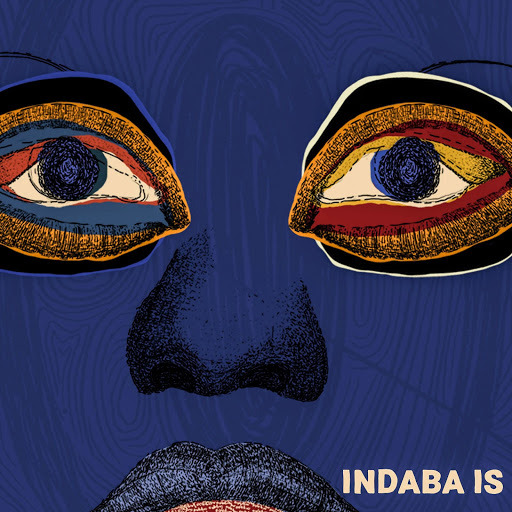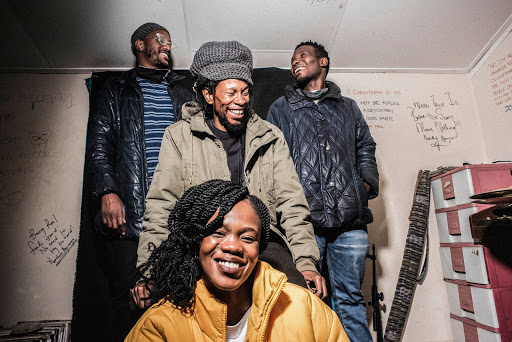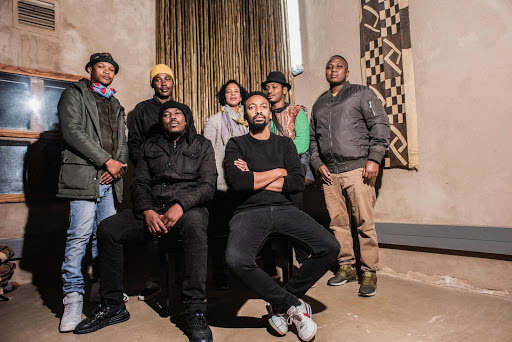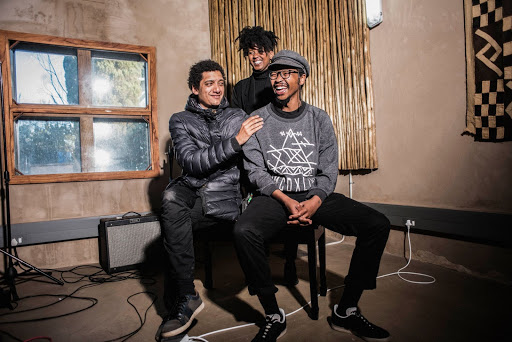Nompumelelo Nhlapho, Sphelelo Mazibuko, Thandi Ntuli, Shane Cooper, Keenen Arends, Thandi Ntuli, Sthembiso Bhengu and Mthunzi Mvubu all feature in Indaba Is. (Paul Botes)
This compilation holds space for many things. The title is homage to Credo Mutwa’s collection of folktales drawn from the continent in his seminal work Indaba, My Children. Recognising the work as an offering and referencing this in a recent Facebook post, Siyabonga Mthembu, vocalist for performance ensemble The Brother Moves On (TBMO), wrote: “… theirs is a communal effort continued from our elders who are passing without the proper recognition. The children have heard Indaba, uthixo ukhona.”
Indaba Is is record grooves etched with the energies of 52 musicians and suckled from a lineage of adroit artists. It is:
An excavation.
An exploration.
An exhibition of the musical scene in Johannesburg.
It’s political.
It’s philosophical.
It’s spiritual.
It is an offering. A plea. A yearning.
It is healing.
It’s deeply personal.
It’s meditation.
It’s documentation.
Archive curation.
It is — remembrance.
Indaba Is self-identifies as: “A record celebrating the alternative avante-garde sound of some of Johannesburg’s jazz and post-rock leanings.”
Press “shuffle” on this track list and you may land on Sibusile Xaba’s Umdali. Here Fakazile Nkosi and Naftali’s vocals stretch, soothe, simmer. This AshK production is a masterful intermingle of futuristic sonic elements with lyrics locating the listener in the present. The cadence calls Umdali by various monikers, with a gentle reverence for the world as it is manifest. Umdali is an acknowledgment chant of creation — of the universe. A recognition meditation.
Shuffle to Bokani Dyer’s opening track, Ke Nako, and be steeped in a frenetic fervour, an urgency. The double-time tonguing of Ndabo Zulu’s trumpet and Sisonke Xonti’s tenor sax solos emphasise this call to unified action. Ke Nako is a pulsating invitation for agency and reclamation — to build forward together and intentionally as a nation.
Shuffle to Dhruv Sodha on tabla and bayaan and Lebohang Moleleki on drums as they stampede to crescendo in iPhupho L’ka Biko’s Abaphezulu. The album is about inclusivity: its success relies on these multiple voices of them who came into the co-creation space to contribute to the collaboration.
 Indaba Is joins the pantheon of Brownswood cross-continental compliations that have come to be time capsules, following on the heels of We Out Here (2018), Sunny Side Up (2019). (Artwork: Rendani Nemakhavhani)
Indaba Is joins the pantheon of Brownswood cross-continental compliations that have come to be time capsules, following on the heels of We Out Here (2018), Sunny Side Up (2019). (Artwork: Rendani Nemakhavhani)
Why it began
Brownswood Recordings is a London-based indie label. Its cross-continental compilations have been referred to as time capsules. The British memento was We Out Here (2018); the follow-up, Sunny Side Up (2019), represented Australia. A dinner in London organised by Brownswood, during a Shabaka [Hutchings] and the Ancestors’ European tour, gave Mthembu the chance to talk to conversation with a representative from the record company. He took the opportunity to volunteer a South African rendition the label could add to its repertoire.
Mthembu was happy to curate the production and he knew that pianist Thandi Ntuli, with her musical aesthetic different from his own way of working, would be the co-facilitating balance the offering needed. And so the seed for Indaba Is, the South African memorial, was sown. This was an act of necessity with the ongoing threat indigenous knowledge systems —housed, too, in music — are under, as they face becoming fading wisps or vestiges.
The work is the sacred act of recall, collecting memory — remembering; of referencing local jazz greats whose influence is perpetuated in contemporary music. This work is the bridge traversing past to present.
Ntuli speaks to this: “Identity has been close to me and my work for a long time. The strivings of our generation are, in many ways, to articulate something that feels authentic, and expressing who you are … Even without articulating identity you can feel that there’s that kind of striving.
“People of colour are moving in different spaces between white, black, and our own spaces. People who go through that all the time are always negotiating different personalities. Because there are certain aspects of yourself that are not affirmed or accepted in some spaces,” she says. “That’s the work — to be able to get to a sense where we can feel that we’re different, but not inferior, in terms of our cultural background, our perspective, where we come from, the way we do things.”
 Ashk, Sibusile Xaba, Fakazile Nkosi and Naftali contribute the futuristic Umdali to the proceedings. (Tseliso Monaheng)
Ashk, Sibusile Xaba, Fakazile Nkosi and Naftali contribute the futuristic Umdali to the proceedings. (Tseliso Monaheng)
How it was created
The project’s collaboration is not only with drummers, bassists, trumpeters and living musicians — but the ancestors who lay the path being walked on.
“We don’t travel alone. Angihambi ngingedwa. I’m a manifestation of my people in the now. And in every space that I come in I’m never travelling alone. The music is my affirmation of that statement yokuthi angihambi ngingedwa,” Mthembu says.
This sense of community, collaboration and co-creation was one of the building blocks of this project. “Artist communities reflect the need for community in general…” Ntuli says. “Not that you have to subscribe to a tribe, but artist communities create a space where you can formulate, grow and stretch your ideas, whether musically or intellectually — whatever it is you’re trying to bring into your art”.
The pandemic shone a spotlight on some neglected issues while exacerbating others. One of these, according to Ntuli, is how poorly supported artists are in South Africa.
“The artist community showed itself as being necessary … The pandemic revealed the lack of support in a way we’ve never experienced before…” she says. “In those situations community is the way that we survive … The idea of having a community in that sense is for protecting our creativity and creative spirit, and for supporting each other in various ways.”
 Lungile Kunene, Sonwabile Ramcwani, Lungile Madope, Candice Moleshe, Lwanda Gogwana and Sipho Mabena recorded All Ok together. (Tseliso Monaheng)
Lungile Kunene, Sonwabile Ramcwani, Lungile Madope, Candice Moleshe, Lwanda Gogwana and Sipho Mabena recorded All Ok together. (Tseliso Monaheng)
The project was a way to offer a sense of support: to regroup and reconnect old familiars with new explorations. Those who recognise the artists featured on the album may find some of the pairings an unlikely orchestration. This was the plan. When the Brownswood opportunity manifested the understanding was, for instance, that TBMO would record something outside their normal repertoire. “Thandi’s track [Umthandazo] is the one,” Mthembu says during the Zoom our call — his cadence as emphatic as when the thought first occurred. The sentiment was unequivocal. This is how TBMO got here.
“Okay, we’re ready for studio —that’s amazing,” Mthembu practises ventriloquism with this line during the Zoom call; his face a close-up on the screen shared with Ntuli.
He’s sharing an anecdote of a recording saved on his phone from two, maybe three years ago, when TBMO, touring at the time, exchanged music with Ntuli, playing and tinkering with each other’s tracks in a session. It was at the end of the rehearsal that Ntuli enthused that it was a wrap. He is intoning her voice.
Mthembu says: “I don’t know where this [Ntuli’s Umthandazo] is gonna be, but this track has to be somewhere. For the last three years when we’ve had Brother Moves On album conversations it was like, ‘Yo, Thandi’s track.’ ‘Yeah, Thandi’s track’.” This was a reminder with the persistence of a metronome. The result, which could have been an incongruous melding, is seamless in Umthandazo Wamagenge, on which TBMO samples the song.
What it took
“A pandemic is the first thing you need,” says Mthembu. It’s his response to what it takes to record an album of the magnitude of Indaba Is. The equation blends 52 local artists, recorded over five days in June and July 2020 with work produced, mastered and fine-tuned over five months to equal an eight-track double-vinyl album released on 29 January this year.
The response to this project’s conditions becomes a tag-team between Mthembu and “synth magician” Ntuli, the co-facilitator behind Indaba Is. Ntuli’s hands gestures the count, ticking off the ingredients list: “Two parts pandemic … ”
Mthembu takes his lead, “Three months hard lockdown. George Floyd showing up during contractual negotiations. All of these things are big, painful things in the black psyche. They’re why we ended up with a project that touches the notes of everything we wanted to do when we started out.
“I think if it was a normal time — when we were touring, et cetera; when me and Thandi were busy with other things, we wouldn’t have gotten what we got.” He seems to catch his thought, hear himself, and then expand for clarity.
“We would’ve gotten something beautiful. But I don’t think we would’ve gotten this great document of where we all are. Or where we all were when we were locked up for those three months … That the [Johannesburg music] scene was and has always been bursting at the seams — that’s the weird part. But now was a different moment. The difference is that the pandemic has knocked us all up,” he says.
 Andrei van Wyk, Gabi Motuba and Tumi Mogorosi are The Wretched, creators of the blistering soundscape What is History. (Tseliso Monaheng)
Andrei van Wyk, Gabi Motuba and Tumi Mogorosi are The Wretched, creators of the blistering soundscape What is History. (Tseliso Monaheng)
How it could be
Artistic and musical communities, often tasked as mouthpieces of the times, can conduit identity and social commentary through their work. Mthembu agrees with this take, but thinks this should be more deliberate: “I don’t think we’ve placed enough intention [in the art doing this work] as black people. Our spaces are that, but they’re engineered by whiteness.
“We all know — but I don’t think we’re creating infrastructure for that knowing, so that the next generation doesn’t have to find that knowing again. And then search within our archives, which have burnt down,” he says.
“I believe we’re doing that in the work but I don’t think the work is enough … Artists of our age and our lobby group, need to come together as a co-operative for this very reason. For archiving spaces that are not north-to-south but south-to-south and south-to-north.”
Ntuli expounds: “Looking into the archives of music, I can call my whole process of being an artist a process of remembering. And the music teaching me things. Not just music but art is a good place to start understanding who we are, because it comes from our souls. Not the masks we wear all the time. And the conditioned versions of ourselves.”
For her, at its core, music means that: “We can find out who we really are.”